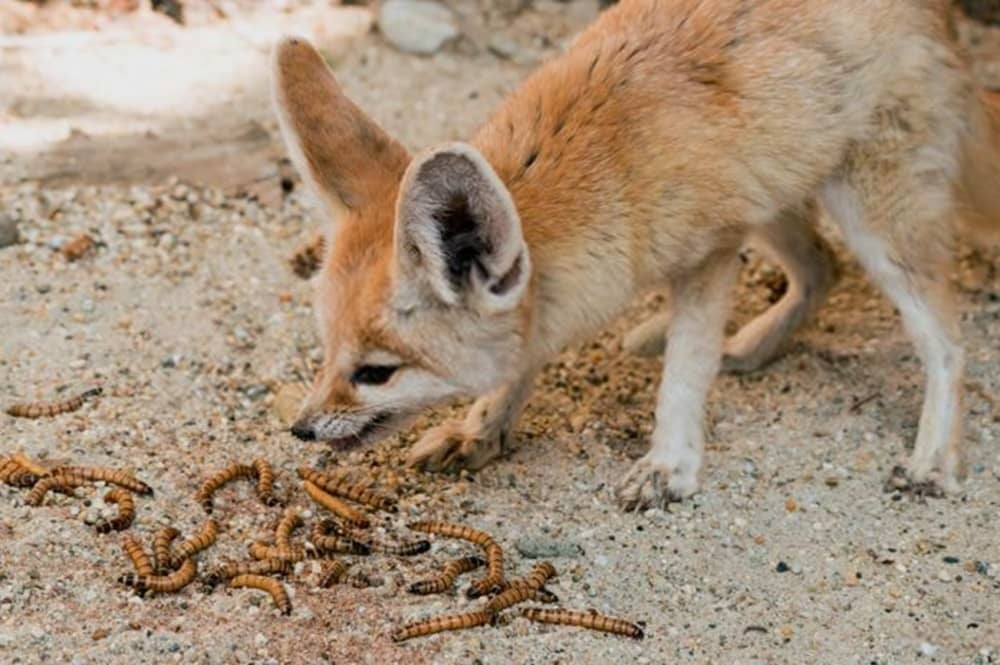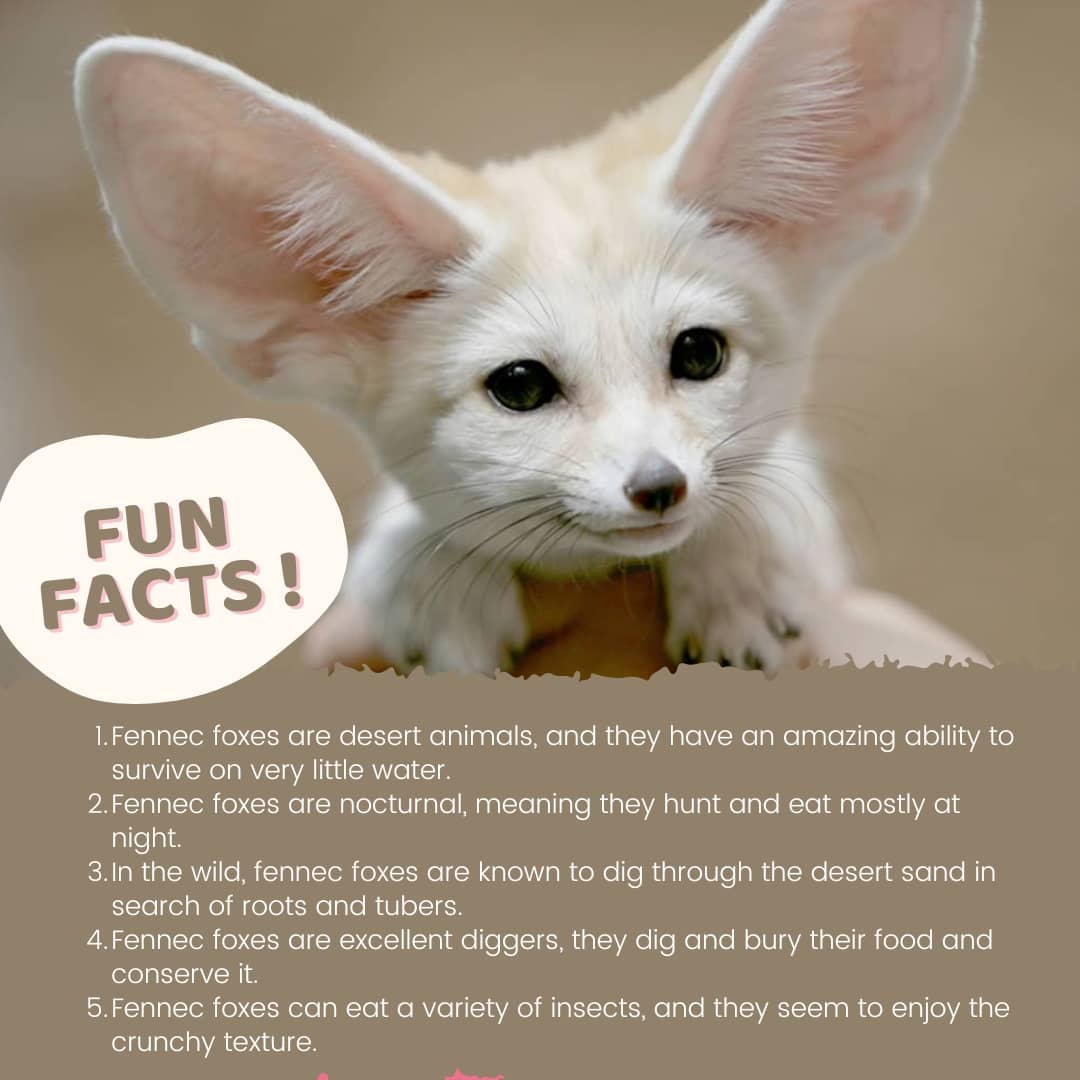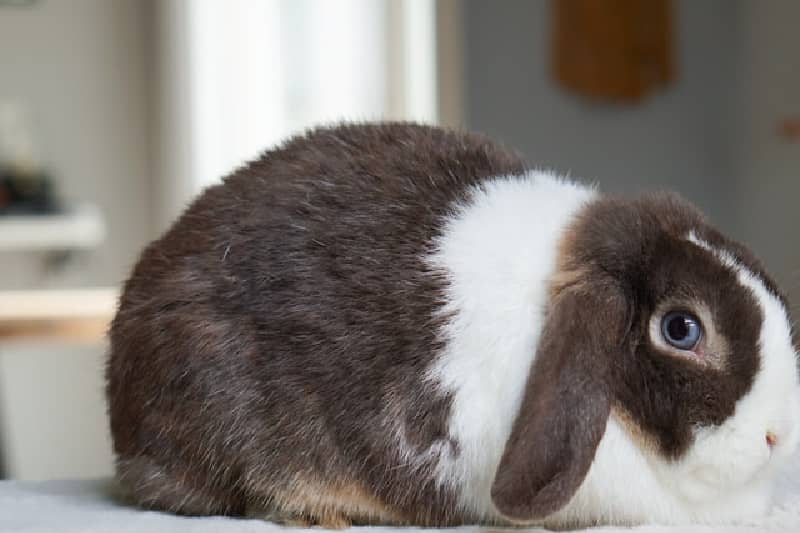The fennec fox diet should be well balanced, and it is an important part of their survival. The fennec fox, known for its large ears and small length, is a fascinating creature of the desert. They are native to the Sahara Desert and parts of North Africa.

They are nocturnal animals and well-adapted to the harsh environment. The scientific name of Fennec Fox is ‘Vulpes zerda’. Whether in the wild or captivity, understanding the fennec fox’s diet is essential to ensuring its health and longevity.
Fennec Fox Diet in the Wild
In the wild, fennec foxes are opportunistic omnivores, meaning they will eat whatever is available in their surroundings. Fennec foxes prey on small rodents like mice, gerbils, and voles. They feed on insects like beetles, grasshoppers, locusts, and other insects, which are a crucial part of their diet. These insects give essential protein and fats. Fennec foxes will consume small birds and their eggs; if they come across nests and reptiles such as lizards and even snakes.

Fennec foxes, to supplement their protein diet, consume plant materials such as fruits, berries, and roots. These plant matter provide hydration and essential vitamins. They forage and hunt in the wild to fulfill their nutritional needs and get a balanced diet with all nutrients.
Although they can survive for long periods without water as they are desert animals, they obtain moisture from their food, particularly from fruits and succulent plants.
Fennec Fox Diet in the Captivity
In captivity, you should give a balanced diet, which is crucial to mimic the nutritional needs of fennec foxes in the wild. You should ensure their diet is rich in protein, healthy fats, and essential vitamins and minerals. Here are some foods that you should include in your pet fennec fox diet:
Commercial Dog or Cat Food:
You can offer high-quality grain-free kibble, formulated for dogs or cats as they need a high protein source. This commercial diet can serve as the base diet for your fox.
Insects:
Just like in the wild, fennec foxes love eating insects, so, you can offer crickets, mealworms, and other insects, which helps them to meet their protein needs.

Cooked chicken, turkey, and occasionally rabbit or quail can be included in your fennec foxes diet. You can also give boiled or scrambled eggs, which are also great sources of protein and nutrients.
Fruits and vegetables:
Fennec foxes enjoy fruits like bananas, apples, and blueberries. Vegetables such as carrots, peas, and sweet potatoes provide fiber and vitamins. You can treat your fennec fox with some fruits or vegetables, including their meal.
Calcium and vitamin supplements are essential for fennec foxes, especially in captivity. Because they are easily deficient in calcium or vitamins and can have health issues related to these deficiencies. To prevent deficiencies and ensure a balanced diet, you can provide calcium and vitamin supplements.
Key Considerations:
- Avoid giving them foods high in fat, salt, or artificial additives.
- Fruits should be provided in moderation due to sugar content.
- Do not feed more to your fennec foxes, as it can lead to obesity.
Diets for Different Stages
If you have a pet baby fennec fox, you need to understand their diet with different stages. As they grow, their diet and needs differentiate. To ensure better health for your fennec fox, it’s crucial to know what kind of balanced diet you should give to them to prevent them from health issues.
Diet for Newborn Fennec Foxes
Newborn fennec foxes are fragile. They are completely dependent on their mothers for their development. They rely solely on their mother’s milk for the first four to five weeks of life. The milk provides all the essential nutrients, including fats, proteins, and antibodies, which are crucial to maintaining their growth and development.
Around five weeks, their weaning process begins, and they start transitioning to solid food. At this age, you can offer some solid foods like mashed fruits or vegetables, finely minced meat, or soaked kibble. In the absence of a mother, there is a specialized puppy formula (with goat milk or kitten milk replacer) that can be used as a substitute. Then, you can gradually increase solid foods while reducing milk over the next few weeks until the foxes are fully weaned by 8-10 weeks.
Diet for Sick Fennec Foxes
When a fennec fox is sick, their dietary needs also change. And diet for sick fennec foxes requires a special diet to promote healing, maintain strength, and prevent further health issues. During illness, fennec foxes are more sensitive and need gentle, soft, and easily digestible foods. You can offer boneless, shredded boiled chicken, scrambled eggs, or boiled eggs to maintain their protein requirements.
When fennec foxes get sick, they require energy and protein. You can also offer plain boiled rice (mixed with lean meat to create a bland diet) and small amounts of low-fat cottage cheese. If your foxes are eating kibbles, it can be softened by soaking in water for some time, then fed to your fennec fox. If your fennec fox is struggling with dehydration, then you can add an electrolyte solution to the water to restore lost minerals and fluids. This electrolyte solution is easily available in pet stores or vets. This helps in regaining important electrolytes like sodium and potassium.
Diet for Adult Fennec Foxes
The diet for the adult fennec foxes must be fully balanced to meet all their nutritional needs, whether for fennec foes in the wild or captivity. An adult needs 30–40% of protein in their diet to maintain their muscles strong. Mealworms, crickets, and other insects are consumed by Fennec foxes. You can offer grain-free kibble formulated for cats or small dogs. Cooked chicken, turkey, and occasionally rabbit can be added for extra protein. Their diet is similar to that of raccoons.

Meat should be free of bones and served in small, digestible pieces. Boiled and scrambled chicken are also good sources of protein and can be offered once or twice a week. Fruits and vegetables can be given to them as treats.
Feeding Schedule
A proper feeding schedule is essential to maintaining a fennec fox’s health. Since fennec foxes are nocturnal, they prefer to eat during the evening or nighttime, so you should ensure to offer their meals in the evening.
Newborns:
Every 2-3 hours until weaning.
Young foxes (after weaning):
3-4 small meals per day.
Adult Fennec foxes:
2-3 meals per day, with occasional treats like insects or fruit.
Feeding Behavior
Fennec foxes show unique feeding behaviors. In the wild, they are known to cache or store food by burying it in sand to consume later. This behavior may continue in captivity, where they hide their food in their bedding or enclosure. You need to notice and monitor the stored food to determine whether it’s spoiled or not. If they consume spoiled or contaminated food, it leads to some serious health issues.
Health Issues Related to Poor Fennec Fox Diet
A poor or imbalanced diet can lead to various health issues in your pet. Fennec foxes such as obesity, which can occur if your fennec fox overfeeds or takes high-fat foods. This can cause heart issues, joint problems, and a shorter lifespan for your pet fox. Another issue that may arise because of a lack of nutrients is malnutrition. This occurs especially when your fennec fox’s diet is lacking in protein or essential vitamins.
Calcium deficiency can also result in weak bones and dental issues. So, you need to be sure to have a properly balanced diet full of essential nutrients. Last but not least are gastrointestinal issues; this issue may arise due to the foods that are too rich and spicy. Processed foods are also harmful to your pet fennec fox. This can cause stomach upset, diarrhea, or other digestive problems.
As an owner, you should ensure that you give a balanced, species-appropriate diet to your pet fox. Also, ensure to provide all the nutrients that are essential to maintaining their health. If any problems occur, consult with an exotic pet veterinarian for guidance on supplements and portion control.
Importance of Hydration
Although fennec foxes have adapted to desert environments and can conserve water efficiently, they still need to be hydrated. Their primary source of moisture comes from food, but fresh water should always be available. In captivity, dehydration can become a concern if they don’t consume enough water. So you can offer some water-rich fruits to your pet fennec fox. Keep monitoring their water intake to avoid kidney issues or urinary tract problems.

Food Storage in the Wild and Captivity
In the wild, fennec foxes store excess food in small caches to survive periods of scarcity. They bury food in the sand and return to it later, particularly when hunting is not fruitful.
In captivity, you may observe similar behavior. While this instinct is natural, it’s essential to remove any uneaten or hidden food regularly to prevent spoilage, bacterial growth, or insect infestations.
Foods to Avoid
If you are caring for a fennec fox, it is important to avoid some foods that could be harmful for them. Some of the foods are:
- Chocolate
- Onions and garlic
- Grapes and raisins
- Avocado
- Caffeine
- Processed meats, Deli meats, sausages, hot dogs, and bacon contain high levels of salt.
- Sugary Foods
- Dairy products like dairy milk and cheese.
- Cooked bones
- Alcohol
- Rae yeast dough
- Fruits with Seeds or Pits
Fun Facts About the Fennec Fox Diet
- Fennec foxes are desert animals, and they have an amazing ability to survive on very little water.
- Fennec foxes are nocturnal, meaning they hunt and eat mostly at night.
- In the wild, fennec foxes are known to dig through the desert sand in search of roots and tubers.
- Fennec foxes are excellent diggers, they dig and bury their food and conserve it.
- Fennec foxes can eat a variety of insects, and they seem to enjoy the crunchy texture.
- During hotter months, fennec foxes consume more juicy fruits and insects, while in cooler months, they may rely more on small mammals and vegetation.
- Fennec foxes can detect prey even when it’s underground because of their hearing ability.
- Fennec foxes have incredible olfactory abilities, they use their sense of smell to locate food. They can sniff out hidden insects or plant roots beneath the sand.
- While fennec foxes can be solitary in the wild, they often enjoy sharing food in groups.
- Fennec foxes often use a pouncing technique to catch prey.
Frequently Asked Questions
Question 1: Can I give my Fennec Fox dairy products?
Answer: No, it is generally not recommended to give Fennec Foxes dairy products. They are often lactose intolerant, and consuming milk, cheese, or other dairy items can lead to digestive issues like diarrhea.
Question 2: How often should I feed my adult Fennec fox?
Answer: Adult fennec foxes typically need 2-3 small meals per day. Feeding them in the evening aligns with their natural nocturnal behavior, as they are more active at night.
Question 3: Can fennec foxes eat raw meat?
Answer: Raw meat can be part of a fennec fox’s diet, but you should prefer cooked meat to reduce the risk of bacterial infections, especially salmonella.
Question 4: How much water does a fennec fox need?
Answer: Although fennec foxes are suited for living in the desert and may obtain some moisture from their diet, they should always have access to clean water when they are in captivity. Dehydration poses a risk.
Question 5: How do I prevent my Fennec fox from becoming overweight?
Answer: You can prevent obesity by controlling portion size, encouraging exercise, and sticking to a feeding schedule.
Question 6: What do fennec foxes eat?
Answer: Fennec foxes can eat cooked chicken, turkey, and occasional small amounts of lean beef to give them a high-quality lean protein.
Question 7: How can I make feeding time more enriching for my Fennec fox?
Answer: To mimic their natural foraging behavior, you can use puzzle feeders, hide food around their enclosure, or scatter small bits of food to encourage searching. This helps prevent boredom and encourages mental stimulation in captivity.
Conclusion
In conclusion, the Fennec fox’s food reflects its desert environment and is an intriguing mix of instinct and adaptation. Being omnivores, they may survive on a wide range of foods, such as fruits, vegetables, small mammals, and insects. To maintain the health and well being of your fennec fox, in captivity, it is crucial to know their varied diet. Whether they live as cherished pets or in the wild, we can support their natural behaviors and improve their quality of life by recognizing and meeting their nutritional needs.



